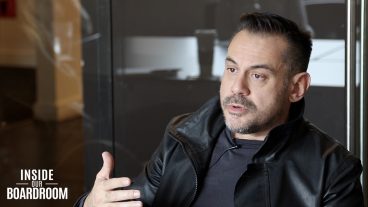The digital revolution is changing the way we work. Automation is on the rise and with it, we’re seeing the demise of some traditional jobs. To ensure that employees are empowered by disruptive new technologies instead of replaced, companies are now seeking ways to “reskill” or “upskill” their workforce.
Business and technology visionary Leonard Brody explores this new trend in his latest article for his series, in partnership with Forbes and KPMG, The Great Rewrite — one of the largest and most award-winning content marketing deals in Forbes‘ history. Through this series, Leonard delves into the profound trends that are rewriting the way we work and live through long-form journalism, case studies, videos, and first-person insights.
In his most recent article, he looks at how companies are redefining roles that are traditionally “less skilled” to incorporate and benefit from new technology. Below is an excerpt from Leonard’s article, read the whole piece and watch the accompanying video here.
The automation of physical labor will not stop. The digital encoding of human cognition and decision-making is arriving parallel to it. Smart robots, sensors, digital agents and other technologies have brought a new vocabulary to human resources: Companies now speak of “reskilling” and “upskilling” — the need to ensure that employees are empowered, not replaced, by the disruptive new technologies that are rewriting the planet.
“Savvy organizations are keeping their people,” said Mike DiClaudio, principal in People & Change Advisory at KPMG LLP. “They’re reskilling them ahead of demand, at a price that makes sense for the organization, at a pace that makes sense for their customers. They’re not waiting for the market to disrupt them. They’re the disruptors.”
Some job functions will wane or vanish, as jobs have throughout history. KPMG LLP’s 2017 report “Clarity on Digital Labor” forecasts that technology will perform the job equivalent of about 120 million employees by 2025. In a survey of 1,896 technology experts by Pew Research Center, “AI, Robotics and the Future of Jobs,” just under half of those polled envisioned significant job losses from automation. But 52 percent believed more new jobs will be created than old ones lost. The question is: What kinds of new jobs will there be?
“Skilled jobs are going to be in more demand, and unskilled jobs will change,” said Cliff Justice, principal in Innovation & Enterprise Solutions at KPMG LLP. “Driving a car may not be a major source of employment 10 years from now. Fast food cooks will likely get augmented or substantially replaced. But there will be new things that it doesn’t make sense to automate, and the unskilled labor will move into those categories, just as it moved from agriculture to factories to the service economy.”
…
Communications giant AT&T has invested in its workforce with its Future Ready reskilling program. It’s a massive effort, costing $200 million to $250 million a year, to identify where every job function is headed and provide workers with the training they need to prepare for roles that have a future.
“The true skill set a lot of organizations look for — and our CEO research has borne this out — is the ability to continually learn and adopt new skills,” DiClaudio said. “When you can do that, you can always add value to a company. You’re not trying to do the same thing you did for 15 years and the skill set for that is out of date. If you’re a lifelong learner, this is a prime opportunity for you to be successful.”
Leonard Brody is currently the Chairman of Creative Labs, a joint-venture with Creative Artists Agency, the largest sport and entertainment agency in the world, and is an award- winning entrepreneur, venture capitalist, bestselling author, and two-time Emmy nominated media visionary.
In his compelling, customized talks Leonard addresses the rapid pace of change, innovation, and disruption facing us all, and what to do about it.
Interested in learning more about Leonard and what he can bring to your next event? Email us at [email protected].




